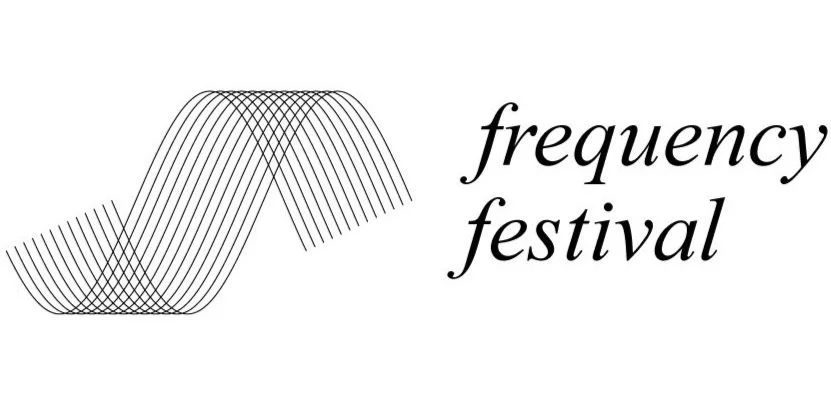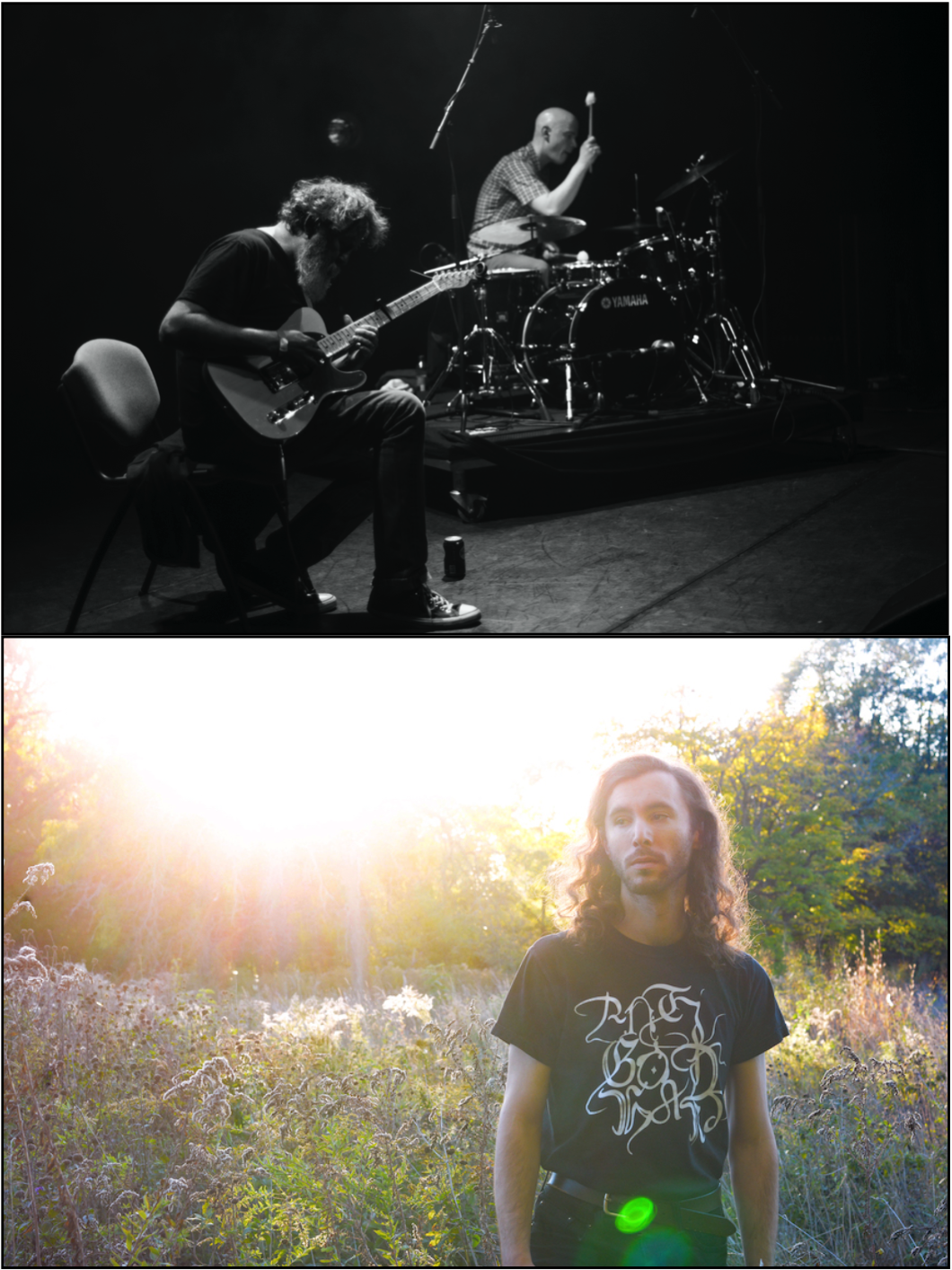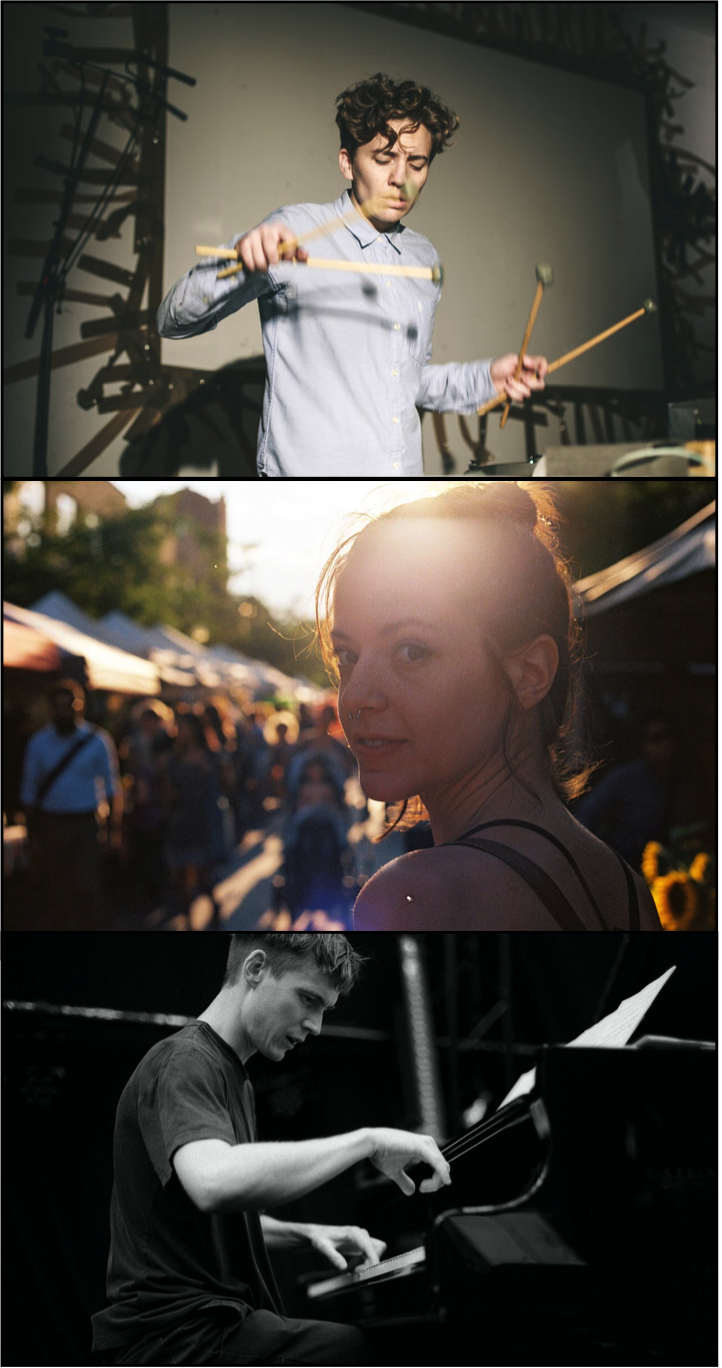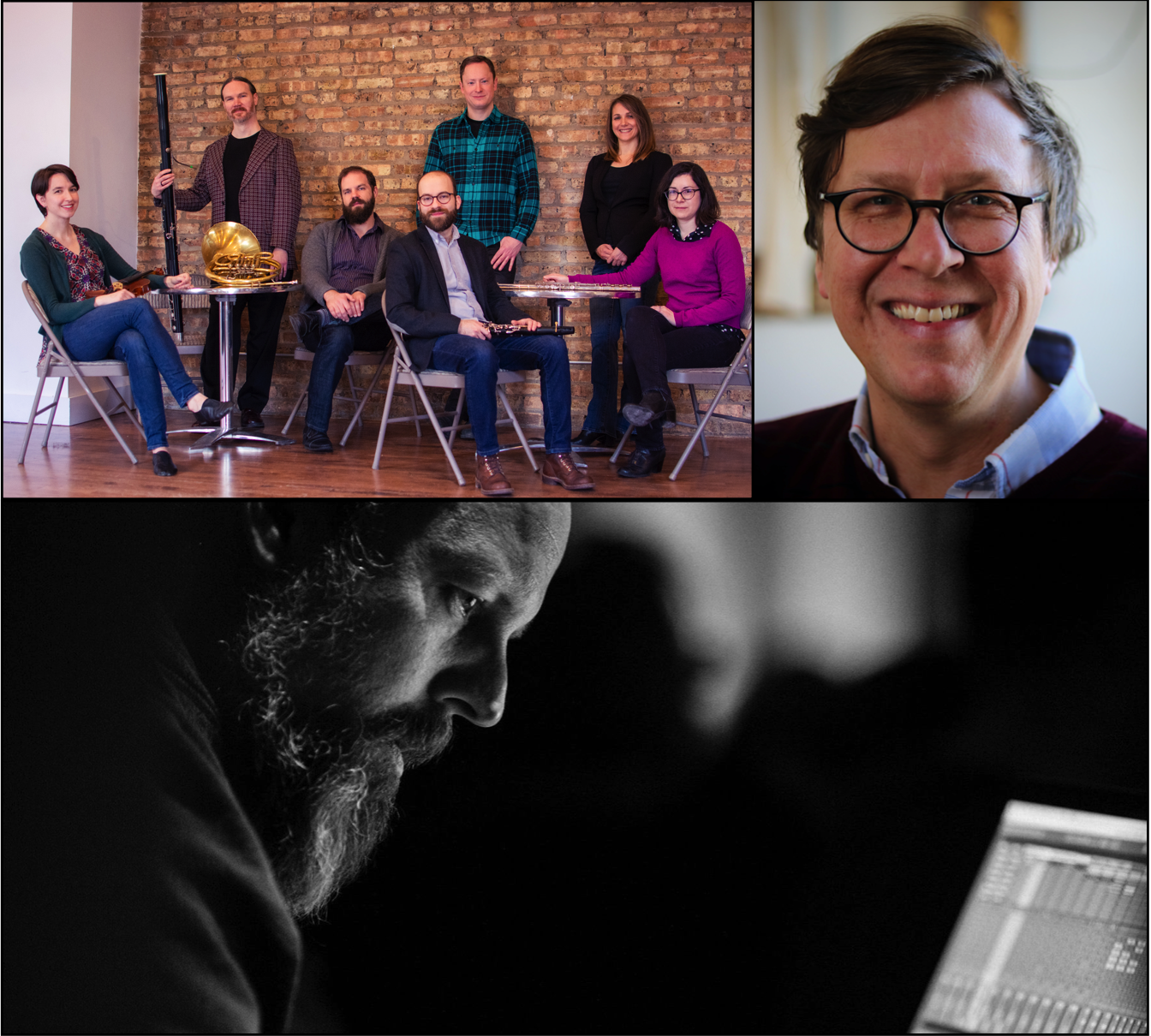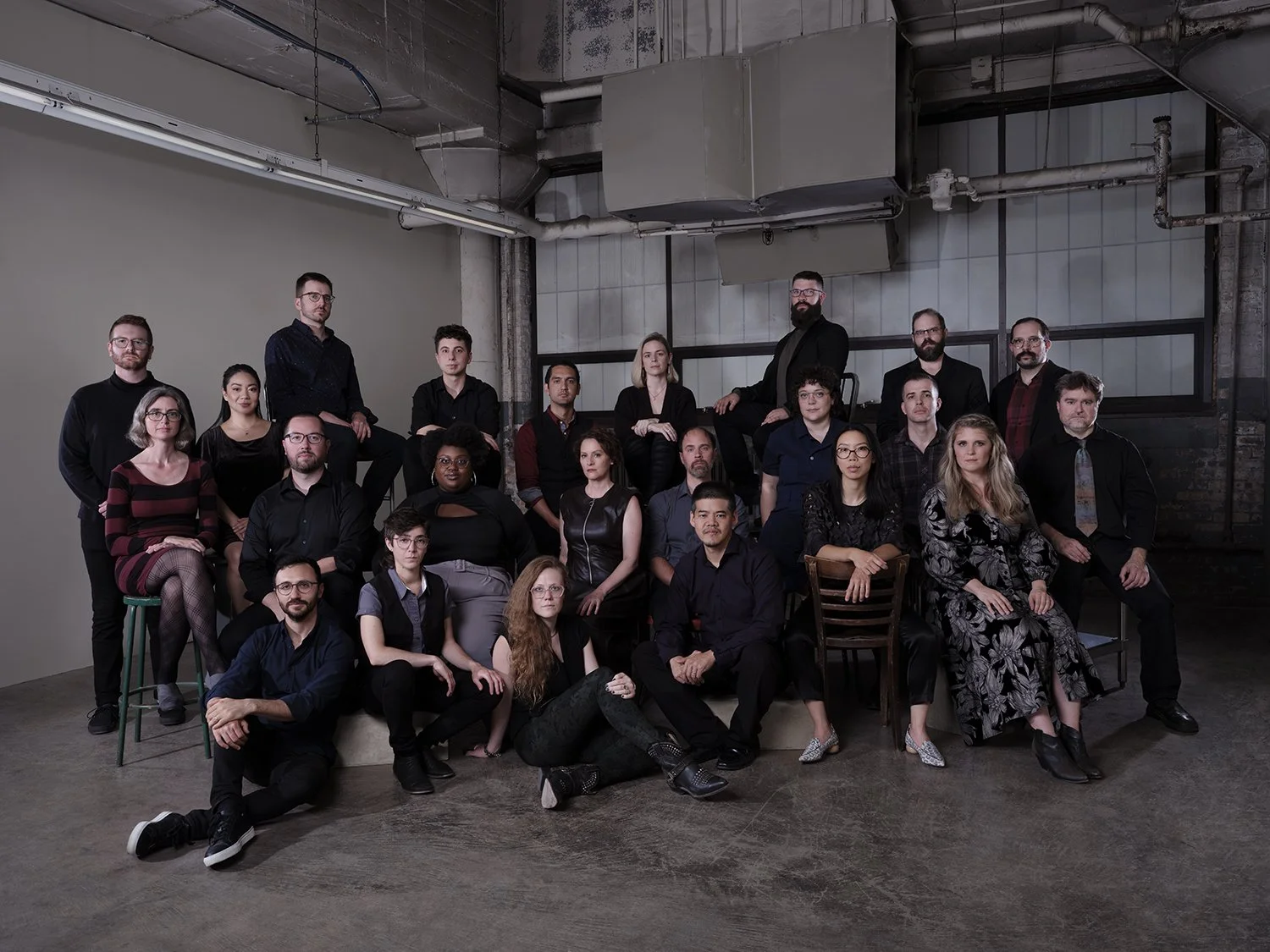2023 Program
Bill Orcutt & Chris Corsano /
Eli Winter
Tuesday, February 21, 8:30 PM
Constellation (3111 N. Western Ave.)
One of the great improvising duos of our time, Bay Area guitarist Bill Orcutt and Ithaca drummer Chris Corsano make their long overdue Chicago premiere to open this year’s edition of Frequency Festival. Orcutt, who played solo at the 2017 iteration of the fest, has forged a powerful amalgam of blues phrasing, stabbing noise, and spindly hypnosis, extracting a titanic flow of sound that holds on to some abstract vestige of the past as it rockets into the void. Corsano is a ferocious improviser who’s built a thick constellation of associations including Akira Sakata, Mette Rasmussen, Paul Flaherty, Bill Nace, and Rodrigo Amado. But his partnership with Orcutt is something special, a collaboration that has morphed organically over more than a decade, evolving into something genuinely telepathic.
///\\\
Over the last five years or so Chicago guitarist Eli Winter has been turning heads, unveiling a new face in the ever-evolving American Primitive sound pioneered by John Fahey. But the Texas native quickly disabused anyone that he was content to settle into fingerstyle perfection, and over time he’s increasingly made collaboration a part of his practice, with folks like David Grubbs, Yasmin Williams, and jaimie branch all appearing on his eponymous 2022 album, with each idiosyncratic guest helping him forge disparate sounds. Tonight Winter conjures that growth in a solo performance.
Photos: Hans van der Linden/Julia Dratel
Jen Torrence & Bethany Younge / Elias Stemeseder
Wednesday, February 22, 8:30 PM
Constellation (3111 N. Western Ave.)
This collaborative performance features the singular Oslo-based percussionist Jen Torrence (Pinquins) and composer and one-time Chicagoan Bethany Younge. Torrence, who has collaborated with a diverse array of composers including Øyvind Torvund, Viola Yip, Thrainn Hjalmarsson, Simon Løffler, Jessie Marino, and François Sarhan (she recently performed his work “"Dreams, why not?" with Beyond This Point at the Steppenwolf Theater in November), is a wildly resourceful and daring musician who routinely defies and expands the role of a percussionist.
Bethany Younge, who was recently hired as a professor at Dartmouth University, embraces a distinctive attitude toward her practice: “All of my works, regardless of instrumentation or media, are, in essence, works for voice and percussion. It is through these mediums that the act of music-making cannot be divorced from the human instigator. By no means do I reject the corporeal gifts those other instruments bestow, but rather reimagine them so that the experiencer/doer—as they are so inextricably linked—cannot be easily forgotten. The being behind the sound and the movement is responsible for making these aesthetic sensations palpable. For this reason, I prefer a working scenario that allows the individual performer to seep into the music itself in a conscious manner as bodily agents of sound. The mannerisms, preferences, and discomforts of the performer for whom I am composing take center stage in both the development and performance of the piece. In the developmental phase, I become a sponge.”
Torrence and Young will perform as a duo on a new work by Jessie Cox, while they both interpret solo pieces by the composer and Trond Reinholdtsen.
Trond Reinholdtsen Institute for Post-Human Performance Practice (Torrence)
Jessie Cox Transmutations: The Immortal I (Torrence and Younge)
Bethany Younge //Atavist III (Younge)
Bethany Younge Organs of Another (Torrence)
///\\\
Austrian pianist Elias Stemeseder, who currently lives in New York, is a musician of uncanny range, curiosity, and sensitivity. He’s known best to American listeners as the wunderkind keyboardist in the Jim Black Trio with bassist Thomas Morgan, but over the last decade his collaborations and interests have expanded broadly. Perhaps no single element of Stemeseder’s exciting practice conveys the full diapason of his art more than his solo piano music. Last year he released Solo Piano, his first album in the format. As the album’s liner note essay avers, “While there’s an undeniable cohesion to the 15 concise pieces here, the range of ideas is sprawling, yet even when the pianist cites a particular inspiration—the driving repetition of notes gleaned from fellow pianist Craig Taborn and the Ligeti étude “Désodre” on the album opener “Repetitionen”—his own conception and realization transcends any given influence.” This acoustic solo performance marks the pianist’s Chicago premiere.
Photos: Juliana Schutz/ Deidre Huckabay / Szymon Hantkiewicz
Julia Reidy
Thursday, February 23, 8 PM -
Bond Chapel (1025 E. 58th Street)
Julia Reidy makes music for processed and acoustic instruments (mostly guitars). Their recent work can be described as a series of non-traditional song forms which combine unstable harmonic territories, rhythmic elasticity and abstract narrative over stretched and episodic forms. Reidy’s current work finds them playing a custom-made guitar to perform music composed in just intonation. As We Jazz Magazine wrote of Reidy’s latest album World in World, “Even though the arrangements feel more airy and lighter than their more recent work, the music ultimately feels denser by dint of its exquisite detail and psychedelic splendor. Each track feels like a mind-altering trip, building a unique sound world and then leaving the listener off-balance as we struggle to gain our bearings. With time, we become acclimated and as the novelty dissolves, we can truly wander in these layered textures, rhythms, and harmonies like otherworldly universe it is.”
This performance is Reidy’s Chicago debut.
Julia Reidy’s appearance in Chicago is presented in partnership with the Renaissance Society and in cooperation with Goethe-Institut Chicago.
Photo: Joe Talia
a.pe.ri.od.ic / Greg Davis
Friday, February 24, 8:30 PM
Constellation (3111 N. Western Ave.)
a•pe•ri•od•ic presents the world premiere of a concert-length work by Magnus Granberg. The ensemble will work with Granberg over the course of a week and then record the work in studio in preparation for a release (with support from the Robert D. Bielecki Foundation) prior to premiering it on the Frequency Festival. In his long-form works, Granberg integrates “experiences, methods and materials from various traditions of improvised and composed musics into a new modus operandi. ”This concert will mark the first presentation of Granberg’s work in Chicago, as well as his first opportunity to visit the city.
__________________
"Programme Note, Aus der Nacht
Programme Note, Aus der Nacht, von den Wehen
Aus der Nacht, von den Wehen was commissioned by and composed for the Chicago-based ensemble a.pe.ri.od.ic in the autumn of 2022. The piece partly consists of selections of materials originally written for another recent piece of mine, Evening Star, Vesper Bell, but which has been reorchestrated and reorganized so as to result in what I believe is a very different piece of music. The piece takes as its points of departure two songs from two different (and indeed rather distant) times and places, So in Love by American composer and song writer Cole Porter and Abendbilder by Franz Schubert and poet Johann Silbert, from whose lyrics the piece also borrows its title. Aus der Nacht, von den Wehen consists of a cycle of 71 different but closely related events, which may also be lengthened or shortened in accordance with the desires of the performers."
-Magnus Granberg
Magnus Granberg’s travel is supported by a grant from the Konstnärsnämnden (The Swedish Art Grants Committee).
///\\\
Chicago native Greg Davis plays in town for the first time in more than a decade, performing work from his stunning 2022 album New Primes. Davis, who now lives in Burlington, Vermont, where he runs Autumn Records, has explored a wide variety of sounds over the decades, but even as he experimented with folk and other song-based forms his immersion and devotion to electronic music has never wavered. His album New Primes employs custom-written software to translate prime number sequences into a mesmerizing universe of sound within a just intonation system. Davis pares his sound materials down to their most basic — a network of pure sine tones — to create a collection of pieces ranging from the almost-tonal to the harmonically alien.
Photos: Ryan Bourque/ Visby International Centre for Composers/ Phi Centre
Sounding Limits:
Pascale Criton, Silvia Tarozzi & Judith Hamann/Ning Yu
Saturday: February 25, 8:30 PM
Constellation (3111 N. Western Ave.)
Pascale Criton’s Sounding Limits series of compositions, two of which were co-authored in close collaboration with renowned string players Silvia Tarozzi (violin) and Deborah Walker (cello). This special performance will mark the first time Criton will be in Chicago to present her work and features the first collaborative transference of Walker’s co-authored piece, to be performed by renowned cellist Judith Hamann.
The program includes three compositions:
Circle Process (Criton-Tarozzi, 2012) for solo violin.
Chaoscaccia (Criton-Walker, 2014) for solo cello.
Bothsways (Criton, 2015) for violin and cello.
Circle Process and Chaoscaccia were co-authored in close collaboration between Criton with Tarozzi and Walker. Their collaborative creative process was instrumental to their composition. With Deborah Walker unable to travel to NYC, this event marks the beginning of a unique transference of Deborah Walker’s Chaoscaccia to be performed by Judith Hamann—the first time this deeply collaborative work will be interpreted by another musician. Hamann will also perform Criton’s piece Bothways alongside Tarozzi.
On Monday, February 27 between 6-8 PM, Gray Sounds presents a free conversation with Pascale Criton about her music, with Silvia Tarrozi and Judith Hamann. The Richard and Mary L. Gray Center for Arts and Inquiry, 929 E 60th Street (Midway Studios next door to the Logan Center, University of Chicago campus.
Constellation’s presentation of the work of Pascale Criton has been made possible through Jazz & New Music, a program of FACE Foundation and the Cultural Services of the French Embassy in the United States with support from the Florence Gould Foundation, the French Ministry of Culture, Institut français, SACEM (Société des auteurs, compositeurs et éditeurs de musique) and Bureau Export.
///\\\
Pianist Ning Yu has performed previously at Frequency Series concerts in the past as a member of Yarn/Wire, the singular New York dual piano-dual percussion quartet. But her creative spark and curiosity have carried on in her solo practice. In 2021 she released a stunning collaboration with composer David Bird, a recent émigré to Chicago, entitled Iron Orchid, an interactive electro-acoustic gem created as part of an installation piece by sculptor Mark Reigelman. Tonight she gives the US premiere of Catherine Lamb’s “Prisma Interius II” and plays the first movement of Klaus Lang’s stunning solo piano work Sieben Sonnengesichter.
Photos: Laurence Prat (Criton)/ Olle Holmberg (Hamann)/ Massimo Simononi (Tarozzi)/ Bobby Fisher (Yu).
Silvia Tarozzi & Judith Hamann
Sunday, February 26, 2 PM
Corbett vs. Dempsey (2156 W Fulton St.)
A special afternoon performance by Italian violinist Silvia Tarozzi and the Berlin-based Australian cellist Judith Hamann, both of whom will play the music of Pascale Criton on the previous evening.
Silvia Tarozzi will perform an improvisation based on a graphic score created by her, looking for a connection with the art work and music of Roscoe Mitchell.
///\\\
Judith Hamann will perform studies drawing on their work for cello and humming, and shaking. Here, Judith challenges the boundaries of their instruments, cello and voice, considering how bodily and sonic thresholds offer generative sites of instability and movement, vulnerability and intimacy.
Ensemble Dal Niente
Sunday, February 26, 8:30 PM
Constellation (3111 N. Western Ave)
Dal Niente closes the annual Frequency Festival with an ear-bending program of compositions by George Lewis, Rebecca Saunders, Raven Chacon, Nicole Mitchell, and Suzanne Farin.
The composers on this program use whistle tones, breathless multiphonics, and haunting timbral shifts to vastly different effects. Rebecca Saunders’ Shades of Crimson: Molly’s Song, named for Molly Bloom’s breathless monologue at the end of Ulysses, weaves alto flute, viola, guitar, and music boxes into sensuous textures; Nicole Mitchell’s Cave of Self-Induction creates an otherworldly trialogue between two flutes and percussion; and Raven Chacon’s Atsiniltlish’ iye passes pitches and gestures between a quintet of instruments in a subtly shifting landscape. Soprano Amanda DeBoer Bartlett is featured in both George Lewis’ a whispered nine, which sets the rhythms of Lyn Hejinian’s poem into wheezing, grooving context; and Suzanne Farrin’s Prisoner Poems, based on the love poetry of Michaelangelo, in which bassoon and soprano become a single voice.
Program:
George Lewis A whispered nine [sop.gtr.fl.vla.perc.conductor]
Rebecca Saunders Shades of Crimson: Molly's Song [fl.viola.guitar.music boxes]
Raven Chacon Atsiniltlish’ iye [fl.cl.bsn.vlc.perc]
Nicole Mitchell Cave of Self-Induction [two flutes and perc]
Suzanne Farrin Prisoner Poems [bsn.sop]
Photo: Alexander Perrelli
